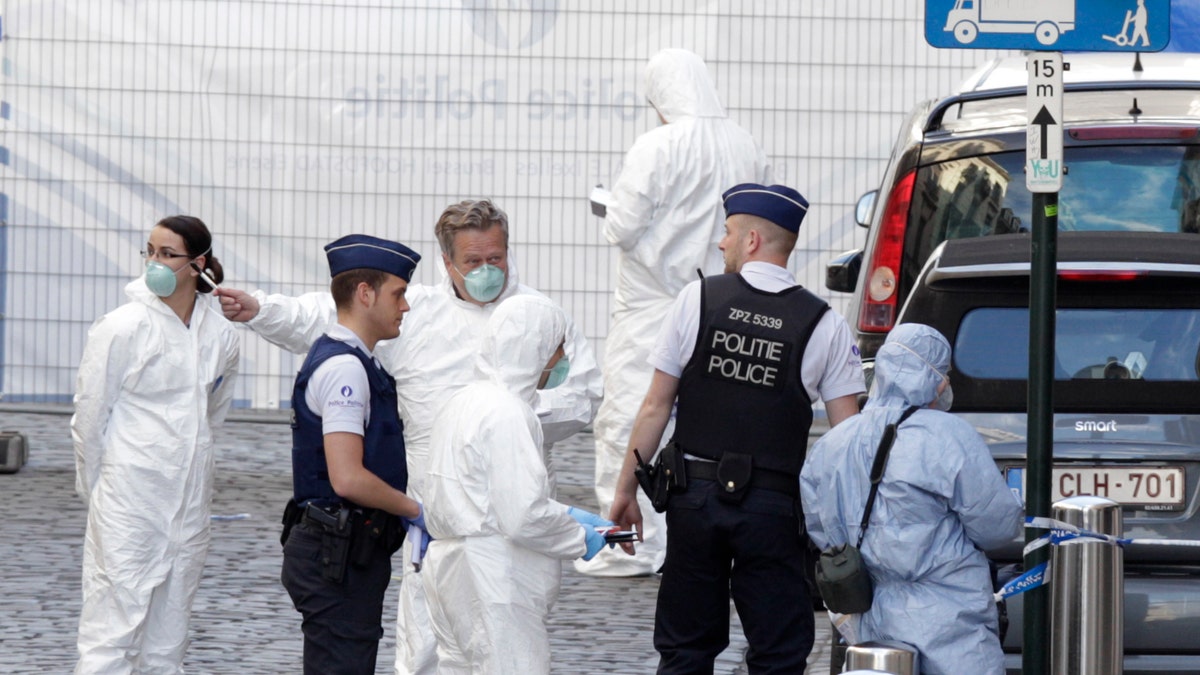
May 24, 2014: Forensic experts examine the site of a shooting at the Jewish museum in Brussels. (AP)
An Israeli couple were among the victims of a shooting at the Jewish Museum in Brussels Saturday that killed three people and left one person critically injured.
Paul Hirschson, an Israeli Foreign Ministry spokesman, told the Associated Press Sunday that the victims were a couple in their 50s from the Tel Aviv area. He says the victims' families have been notified of their deaths and that Israel is arranging to fly their bodies home. Their names were not released.
Hirschson says the attack appears to have been directed at Israelis or Jews, but Israel is awaiting conclusions from the Brussels authorities. He says: "An Israeli couple visiting the Jewish Museum leaves too much to the imagination."
Belgian prosecutors said late Sunday that they were searching for a single suspect, whom deputy prosecutor Ine Van Wymersch described as "armed and well prepared." One man was detained shortly after the shooting, but was later released without charge.
The Associated Press reported early Sunday that a French national was also killed in the shooting, while a Belgian national was "still alive but in a very critical condition," according to Van Wymersch. Neither victim's name was released.
The bloodshed, which came on the eve of national and European Parliament elections, led officials to immediately raise anti-terror measures.
Belgian Foreign Minister Didier Reynders, who was in the vicinity, said the scene "was terrible and left me shocked" as he saw the bodies of two of the victims lying at the entrance of the museum, located in the swanky Sablon neighborhood of Belgium's capital.
Reynders said that "you cannot help to think that when we see a Jewish museum, you think of an anti-Semitic act. But the investigation will have to show the causes."
Van Wymersch said that all three dead were struck by bullets in the face or throat.
Prime Minister Elio Di Rupo expressed support for the Jewish community, and said "everything has been mobilized that can be mobilized" to bring the killer or killers to justice.
"All Belgians are united," he said.
A statement issued by the office of Israeli Prime Minister Benjamin Netanyahu condemned the attack and said, "This act of murder is the result of constant incitement against Jews and their state."
Milquet said anti-terror measures had immediately been heightened as a precaution. "We decided to apply to a maximum level of protection to Jewish sites," she said.
European Jewish Congress President Moshe Kantor said that, even though it has yet to be established whether the attack was anti-Semitic, "we are acutely aware of the permanent threat to Jewish targets in Belgium and across the whole of Europe."
"European governments must send out a clear message of zero tolerance toward any manifestation of anti-Semitism," Kantor said in a statement.
The attack, which took place shortly before 4 p.m., occurred in the Sablon area, which was hosting a three-day jazz festival and is usually clogged with tourists and shoppers on weekends. It has cobblestone streets with numerous antique shops, trendy cafes and museums, including the Jewish Museum.
Police cordoned off several streets around the museum with blue-and-white police tape, and numerous ambulances and police vans were at the scene.
Viviane Teitelbaum, a member of the Brussels legislature, said anti-Semitic attacks reached a peak in the early 1980s but had dropped off, but she noted a recent rise in anti-Jewish sentiment.
"It has been a very difficult place to live" for Jews, she said, adding that many young people are leaving the country. She said some 40,000 Jews live in Belgium, half of whom reside in Brussels.
Simone Susskind, another Brussels politician, said the museum has been at its current site for around a decade, after moving from an old synagogue in southern Brussels. She said her late husband David was a driving force behind the museum's creation, believing that as home of the European Union and self-proclaimed "capital of Europe," Brussels needed a museum to recount the history of Belgium's Jewish community.
In neighboring France, President Francois Hollande condemned the "horrifying killings with the greatest force." In a statement, he expressed France's solidarity with Belgium and offered condolences to the families of the victims.
The Associated Press contributed to this report.
